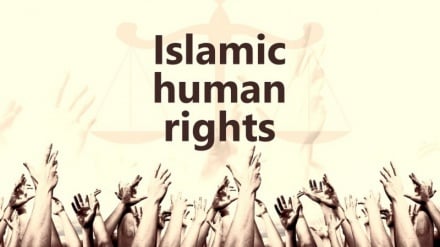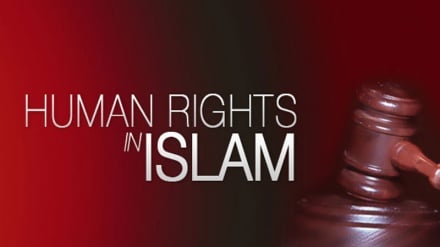Islamic Human Rights (31)
Welcome to the 31st weekly episode of the series Islamic Human Rights. Today, we speak of the status of freedom of expression in Islamic human rights.
In the previous weeks, we discussed the freedom of thought. It was also mentioned that the divine religion of Islam opines that belief should be based on freedom of thought. If mankind freely and prudently accepts a belief, this is valuable and praiseworthy in the view of sacred religion of Islam, and no one maintains the right to impose another belief on that individual. Freedom of expression is another undeniable and valuable right, which should be honored and respected.
Expression is one of the important means of communication, and conveys man’s thoughts and culture among different generations and communities. The expression of any individual displays his character and ideological identity, and provides a means for presentation of his thoughts, values, ideals, emotions, and sentiments. Scientific- and political-wise, presentation of different thoughts leads to growth of knowledge and thoughts of human communities and gives rise to ample benefits for the individual and the community. Meanwhile, denial of this freedom leads to a decline in human thoughts and knowledge, and sabotages the development and growth of the community and individuals. Meanwhile, denial of this divine blessing to mankind is the biggest violation of the most natural and innate of human rights. Thus, freedom of expression emerges as the most important and beautiful manifestation of man’s wisdom and prudence. Throughout the course of history, freedom of expression has always been one of the main factors behind the success and continuation of divine movements. The Universal Declaration of Human Rights has named freedom of thought and expression as one of human rights, which all nations should respect and honor.
The 19th Article of the Universal Declaration of Human Rights declares that every individual maintains the right to freedom of thought and expression.
In the divine religion of Islam; freedom of expression and press are two of the inalienable rights of individuals. The importance which Islam attaches to expression and pen is evident; right from the beginning of prophet hood of the Prophet of Islam, Mohammad (Blessings of God upon him and his progeny) and in the first ayahs which were descended to Prophet Mohammad in Cave Hera in Mount Nour.
The 1st to 5th ayahs of Surat Al-‘Alaq note: “Read in the Name of your Lord who created; created man from a clinging mass. Read, and your Lord is the most generous, who taught by the pen, taught man what he did not know.”
In this manner, it is observed that God has considered expression and pen as a means for understanding among humans so that they would be informed of each other’s goals; and the truth would be clarified via the free expression of thoughts. In order for the pen and expression to be effective, man should be free in applying and utilizing them. Prophet of Islam was duty-bound to herald this to servitudes of God. The 17th and 18th ayahs of Surat al-Zumar note: “…So give good news to My servants who listen to the word of Allah and follow the best sense of it. They are the ones who Allah has guided, and it is they who possess intellect.”
Freedom of expression and its promotion among ordinary people principally doesn’t cause any problem. However, in oppressed communities, expression of thoughts against ruling systems is not an easy task. The sacred Islamic system is against such suppression.
The First Infallible Imam of the Prophet of Islam’s Household, Imam Ali (Peace be upon him) considers freedom of expression as the secret behind community’s health; and instructs his deputy in Egypt, Malek-e Ashtar, to hold public meetings, in order to raise an opportunity for those, who have demands, to freely make their remarks.
Upon studying several hadiths, one realizes the importance attached to freedom of expression during the advent of Islam. Upon reference to the history of lives of religious figures, one realizes that they complied with, and encouraged freedom of expression in word and practice, to the extent that it would not harm the public order and community’s ethics. The Prophet of Islam always allowed thinkers to freely express their views, criticisms, and complaints. God in Holy Quran has introduced Prophet Mohammad as a kind and goodhearted person. In the 159th ayah of Surat Al-I’Imran, God notes: “… and had you been harsh and hardhearted, surely they would have scattered from around you.”
The contemporary thinker, Martyr Morteza Mottahari, notes: “When in the history of the universe you have seen that in a land, whose residents maintain religious sentiments; non-religious individuals would be allowed to come to Prophet’s Mosque, or sit in Mecca and make remarks as they wish; denying God, the prophet hood of Prophet of Islam, prayers, and Hajj rituals. There are ample examples of this in the history of Islam. it was due to grant of these freedoms that Islam lasted. The divine religion of Islam lasted because it courageously and openly allowed the expression of opponent thoughts.”
This appropriate approach and tradition continued during the rule of Imam Ali (Peace be upon him), and other Infallible Imams of the Prophet of Islam’s Household. History has registered some of the discussions of Infallible Imams with apostates, and People of the Book. Grant of social and political freedom to Khwavarej by Imam Ali is a unique example of democracy in the world.
It should be noted that freedom of expression is not tantamount to allowing individuals to express whatever one wants; whether it would be beneficial or detrimental for the community and/or would lead to corruption, and sedition. Practically, no legal system in the world allows absolute freedom of expression, and each country, based on its ideology, and level of commitment to ethical principles, has specified a number of restrictions for freedom of expression. All of the world’s thinkers believe that mankind cannot be absolutely free in his actions and behaviors.
In the view of religious teachings, sources of rights, and many thinkers of the world; freedom of expression can function properly when it is implemented within a framework of logical rules and regulations and conditions. This is because absolute freedom inflicts harms on the individual and the community. The divine religion of Islam supports man’s freedom of thought and expression, but doesn’t agree with absolute and unconditional freedom. In the next episode, we will speak of view of sacred religion of Islam about the boundaries of freedom of expression.
MR/SS


